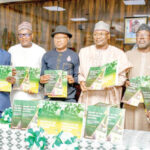…Urges them to adopt electronic voting
A former Chairman, Independent National Electoral Commission (INEC), Prof. Attahiru Jega, has urged the 9th National Assembly not to ignore the mistakes and other controversies of the 8th Assembly in other to surpass their predecessors’ landmark achievements.
Senator Ahmed Lawan is the incumbent Senate President and Chairman National Assembly; and Hon. Femi Gbajabiamila is the Speaker of the House of Representatives.
The 8th assembly was led by a former Kwara State Governor Bukola Saraki as Senate President and Chairman National Assembly; and Yakubu Dogara as the Speaker of the House of Representatives.
This is as he urged the lawmakers to streamlined committees, saying their multiplicity is a disservice.
Jega gave the advice on Friday in Abuja at the public presentation of the 114-page “Scorecard of the 8th National Assembly: Report of a performance assessment of the 8th National Assembly in Nigeria’s Fourth Republic” organised by the YIAGA-Africa Centre for Legislative Engagement (YIAGA-CLE).
According to Jega, who presented some of the findings of the report, the research showed that the 8th assembly did more than any previous assembly in terms of introducing about 2,166 bills out of which 515 were passed and 21 were alteration bills.
He however said that while the work was commendable, it is not enough to produce bills, but that there was need to also pay attention to the quality of bills as many of them were not accented to by Mr. President.
He said that the research showed that there was a room for improvement with regards to the quality of the bills produced.
“There is need to pay attention to the quality of bills that are introduced so we strongly recommended an establishment of a mechanism for pre-legislative scrutiny, so that bills can be scrutinised.
“Then a situation where a bill can go to the president and returned for inconsistencies or editorial work and so on will not even arise,” Jega said.
He also urged the National Assembly to consider creating a Legislative Standards Committee, to oversee the pre-legislative scrutiny process and also establish a monitoring mechanism to monitor implementation of bills in MDAs.
He said, “They (lawmakers) should entrench Pre-Legislative Scrutiny as a norm for all proposed legislations whether executive or private member bills. With this, legislative proposals would be enriched as a result of consultations with practitioners, experts and all other stakeholders.
“In order to improve the quality of legislative oversight, the assembly should establish a minimum benchmark or targets for committees to catalyze activism and guide their performance level.”
Jega said that legislative committees should uphold the principles of integrity, professionalism, transparency and mutual respect in the performance of oversight functions.
While urging the National assembly to prioritise adequate funding for committees, which is pivotal to effective legislation and oversight, he also urged the National Assembly to ensure transparency and accountability for funds allocated to committees.
He also urged them to adopt electronic voting on bills and motions and that voting records should be available to members of the public on all National Assembly online and offline channels.

 Join Daily Trust WhatsApp Community For Quick Access To News and Happenings Around You.
Join Daily Trust WhatsApp Community For Quick Access To News and Happenings Around You.


